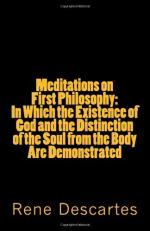Sect. LXXV. Answers to the Objection of the Epicureans drawn from the Eternal Motion of Atoms.
Nothing can be more absurd than to speak of successive combinations of atoms infinite in number; for the infinite can never be either successive or divisible. Give me, for instance, any number you may pretend to be infinite, and it will still be in my power to do two things that shall demonstrate it not to be a true infinite. In the first place, I can take an unit from it; and in such a case it will become less than it was, and will certainly be finite; for whatever is less than the infinite has a boundary or limit on the side where one stops, and beyond which one might go. Now the number which is finite as soon as one takes from it one single unit, could not be infinite before that diminution; for an unit is certainly finite, and a finite joined with another finite cannot make an infinite. If a single unit added to a finite number made an infinite, it would follow from thence that the finite would be almost equal to the infinite; than which nothing can be more absurd. In the second place, I may add an unit to that number given, and consequently increase it. Now what may be increased is not infinite, for the infinite can have no bound; and what is capable of augmentation is bounded on the side a man stops, when he might go further and add some units to it. It is plain, therefore, that no divisible compound can be the true infinite.
This foundation being laid, all the romance of the Epicurean philosophy disappears and vanishes out of sight in an instant. There never can be any divisible body truly infinite in extent, nor any number or any succession that is a true infinite. From hence it follows that there never can be an infinite successive number of combinations of atoms. If this chimerical infinite were real, I own all possible and conceivable combinations of atoms would be found in it; and that consequently all combinations that seem to require the utmost industry would likewise be included in them. In such a case, one might ascribe to mere chance the most marvellous performances of art. If one should see palaces built according to the most perfect rules of architecture, curious furniture, watches, clocks, and all sort of machines the most compounded, in a desert island, he should not be free reasonably to conclude that there have been men in that island who made all those exquisite works. On the contrary, he ought to say, “Perhaps




